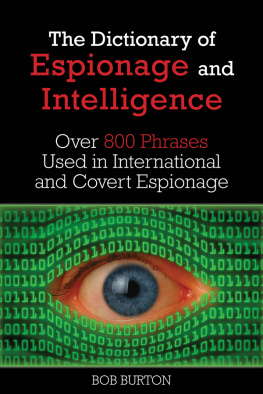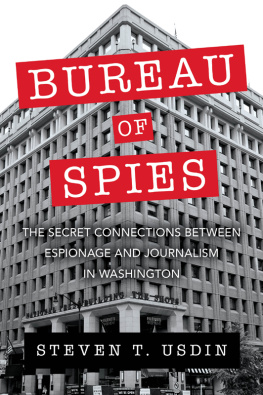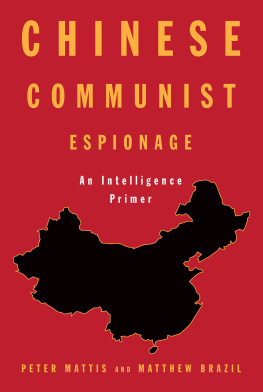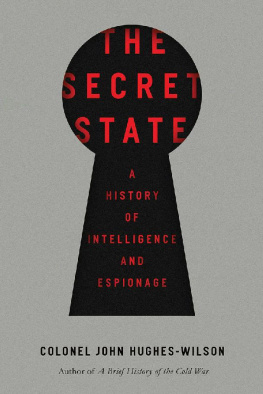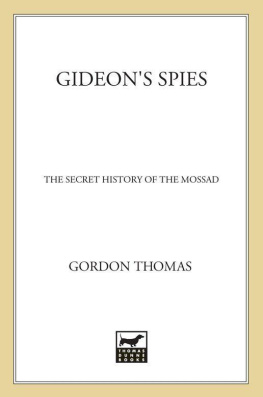THE DICTIONARY OF
ESPIONAGE
Spyspeak into English
Joseph C. Goulden
New Foreword by
Peter Earnest
Executive Director,
International Spy Museum
DOVER PUBLICATIONS, INC.
Mineola, New York
For the Bearess of the Flagship,
Who speaks spook and other languages
As well; with love from your
Perpetual Shipmate
for Lacey, who brought 78 pounds of unabashed Black Lab
love and affection into The Fam
and for friends who were Masters of The Game and mentors
for a novice: Sam Halpern, Cameron John La Clair, Jr., James
R. Lilley, Cord Meyer, Robert W. Page, David Atlee Phillips,
John Waller, and John Walker. Thanks, guys!
________________
Copyright
Copyright 2012 by Joseph Goulden.
Foreword copyright 2012 by Peter Earnest.
All rights reserved.
Bibliographical Note
This Dover edition, first published in 2012 is a revised and updated
republication of the work originally published by Stein and Day,
New York, in 1986.
Library of Congress Cataloging-in-Publication Data
Goulden, Joseph C.
The dictionary of espionage : spyspeak into English / Joseph C. Goulden ; new foreword by Peter Earnest.
p. cm.
Originally published: The dictionary of espionage : spookspeak into English / Henry S.A. Becket. 1986
Includes bibliographical references and index.
ISBN-13: 978-0-486-48348-1
ISBN-10: 0-486-48348-7
1. EspionageDictionaries. I. Becket, Henry S. A. Dictionary of espionage. II. Title. III. Title: Spyspeak into English.
UB270.B35 2012
327.1203dc23
2011040245
Manufactured in the United States by Courier Corporation
48348701
www.doverpublications.com
Foreword
We use language and words to describe the world around usand sometimes to shape it to serve our own ends.
The belt was his favorite child development tool. Thats Mafia underboss Tony Soprano talking about his father. Blunt, funny, and often profane, Tony and his crew of tough-talking New Jersey mobsters burst onto the American scene in early 1999 and almost overnight became a hit on American TV. The colorful, violent world of The Sopranos gave Americans a window into the personal lives and workings of a criminal gang and their families.
Week after week, we crowded around to peer through that window in order to savor a world few of us knew or would ever experience. We relished every noisy confrontation, every beating, and every threat to whack a rival. We loved listening to them, to their jargon, and to their crude attempts at sophistication.
At the height of the shows popularity, there were reportedly bona fide criminals and mobster wannabes who adopted some of the Sopranos jargon and mannerisms. It was the Sopranos language: how they talked and what they said that was at the heart of their culture. Copying them wouldnt make you a mobster, any more than Gouldens Dictionary of Espionage will make you a secret agent. But you can sound like one.
James Bond, George Smiley, Jack Ryan, and all the books, movies and TV shows spawned in the latter years of the Cold War opened a wide window into the shadow world of espionage, spies, and double agents. Even more light was shed by the vast amount of information revealed by the media, the memoirs of practitioners, and even the classified documents released to the public (albeit often reluctantly).
Gouldens Dictionary will take you one step closer to that world, whether you just want to write about spies or you want to be one. Goulden has known more spies and more about clandestine operations than many of the real spies he writes about. Hes a stickler for accuracy and has one of the most sensitive, built-in BS-detectors in the nations capital.
As a young, newly recruited CIA case officer in the mid-1950s, I was assigned to the Farm, the Agencys legendary training site in Virginia (cf. Goulden). The clandestine ops training, the new language and jargon, indeed the whole way of thinking had an extraordinary impact on our young minds. Assuming a student alias, participating in immersive training in nighttime cross-border operations, recruiting and debriefing agents, and practicing how to conduct and elude surveillanceall of which was so engrossing and intense that it was indeed like entering another country and mastering a new language and vocabulary: that of the Cold War Intelligence Officer and his arcane craft.
The Dictionary of Espionage brings back vivid memories of those exciting days and of first encountering that new language. Now you too can enter that world and enjoy a lively tour through the plain talk, double talk, and euphemisms of Spyspeak as rendered by its practitioners.
P ETER E ARNEST
Executive Director,
International Spy Museum
Introduction to the 2011 Edition
For the last twenty or so years, I have been the primary reviewer of intelligence and espionage non-fiction books for The Washington Times , thanks to the generosity of the late Colin Walters and his successor as book editor, Carol Herman. Listing the scores of titles I reviewed during these years would serve no truly useful purpose. When a particular volume proved of special value in defining a term, it is listed as a source under that heading.
I began accumulating books on intelligence and foreign affairs in 1956, while a student at the U.S. Amy Intelligence School, Fort Holabird, Maryland (in a sequence so low-grade, I must add, that I was not issued a cloak, much less a dagger). Over the years my holdings grew to many thousands of volumes. The bulk of this collection now reposes in the library of the International Studies Program at Virginia Military Institute, Lexington, Virginia. When ISP ran out of shelf space, the overflow was directed to the library of the George C. Marshall Foundation, on the VMI campus in Lexington; the Institute of World Politics, a graduate level school on national security in Washington; and the National Security Program at DeSales University, Center Valley, Pennsylvania.
Given that my own collection is now scattered to four libraries, a work of continuing value to me in doing this update was Spy Book: The Encyclopedia of Espionage , by Norman Polmar and Thomas B. Allen, Random House (2nd edition), 2004. I drew upon this Polmar-Allen to confirm dates and names of persons involved in various intelligence matters. Spy Book would be a valuable cornerstone volume for any intelligence collection.
Persons eager for more goodand authoritativeintelligence reading are directed to online issues of Studies in Intelligence , the CIAs in-house journal, produced by the Center for the Study of Intelligence. For years, Studies was published in classified form and was not available to anyone outside the intelligence community. Online articles date to 1992 and include many that have been declassified (some still carry the SECRET or CONFIDENTIAL marking). The subject matter varies widely: articles on episodes in the history of intelligence, how-to pieces on tradecraft, and various theories of intelligence analysis. The CIA website also has a reading room section of declassified documents which could keep one reading for weeks, even months. The Center for Cryptologic History of the National Security Agency, also offers a wealth of online reading, albeit highly technical.
* * *
Because of contractual obligations to another publisher at the time, I used the pen name Henry S. A. Becket for the first edition of The Dictionary of Espionage. This cover name survived less than 24 hours after publication. Now I am happy that Dover has given me the opportunity revise the book and to correct some errors under my own name. I give special thanks to my friend of more than four decades, Paul A. Dickson, who shepherded the book through Dover, and to my pal Peter Earnest, a retired Agency operations officer who now runs the International Spy Museum in Washington. Comments can be sent to


